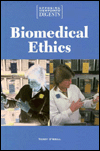

 |

|

The average rating for Biomedical Ethics based on 2 reviews is 3.5 stars.
Review # 1 was written on 2017-04-06 00:00:00 Claudia Harrison Claudia HarrisonI am no stranger either to books on textual criticism [1] or the writings of Jane Austen, and so this book is a natural one for me to read even if it is aimed at teens and young adult readers who are just becoming familiar with textual criticism rather than to people like myself who are somewhat experienced in it.� This book is part of a family of volumes that seeks to teach people how to engage in literary criticism by providing easy to understand examples of it, and as Pride & Prejudice happens to be a book I enjoy reading this was certainly a worthwhile book as far as I am concerned.� To be sure, I happen to have some disagreements with the way the editor assumed that Jane Austen's modest description of her work to a relative was at face value, not only because Jane Austen was being modest to a male about her work (a rather common behavior among women, I have found) but because Jane Austen in general is a profound ironist who likely was aware of the quality of her writing even if she was not inclined to brag about it as is the habit of some. At any rate, this book at under 200 pages is by no means a very lengthy example of textual criticism but it makes for pleasant and generally enjoyable reading for those who are fans of either Jane Austen or textual criticism or both.� After a foreword which appears to be generic to the whole series that discusses Moby Dick and a short biography of Jane Austen, the first chapter contains three essays on major themes in Pride & Prejudice like marriage and manners, social moderation, and fate and choice (1).� After that there are four essays on characters, with a couple of essays relating to the dynamic between Elizabeth and Darcy, one that contrasts Darcy and Wickham, and another that looks at the way minor characters show women's roles (2).� Then there are three essays that look at structure and plot that seek to examine the place of Pride & Prejudice within literature as well as look at the narrator's voice and how it shapes the relationship between the author and the reader (3).� Two essays on symbols and language follow (4) that examine the significance of gardens and letters, before the last three essays examine irony and wit in Pride & Prejudice, of which there is much (5). While this book is by no means an exhaustive look at the textual criticism of Pride & Prejudice and a discussion of why it remains worthy of reading and thinking about today, this book is certainly a good beginning for many readers in order to enjoy Pride & Prejudice on a deeper level or to engage in the task of literary criticism.� Sometimes people need to be reassured that the novels they enjoy reading are worthy of the effort of textual criticism, and sometimes it is enjoyable to teach the task of examining the deeper layers of works through writings that are considerably friendlier entrances into the task than may be the case in other examples.� Pride & Prejudice is a delightful novel full of sparkling wit and at its core are two immensely worthwhile characters.� One can imagine people in one's life who resemble the characters of the novel even now, and the structure of the book lends itself to thinking about the way that the understatement of an author and the behavior of a narrator can drastically shape one's view of a given work.� This book is certainly a good one for Austenites who are willing to delve a bit deeper into one of Austen's masterpieces. [1] See, for example: |
Review # 2 was written on 2021-06-05 00:00:00 Dandanmre Mre Dandanmre MreMore citizens of active democracies should be exposed to this book. It isn't required reading in high school and I am unaware of an effective movie that addresses the many, many prescient issues raised in Huxley's seminal novel of a not-too-distant dystopian future that sounds disturbingly possible. These essays explore Brave New World and I was amazed at how current, how right now - many of the essays were, despite many of them being written in the 50-60s. I picked it up at the perfect time and am really glad I did. If you are surrounded by a sleeping culture speaking in platitudes and cliches, and obediently spouting the zeitgeist's latest catch phrases, and feel like something must be wrong in your zombie environment - this refresher course in a classic could reassure you it isn't just you. Also, Huxley wrote this novel in 4 months. Just in case any writers out there are contemplating ending it all, perhaps you should. |
CAN'T FIND WHAT YOU'RE LOOKING FOR? CLICK HERE!!!